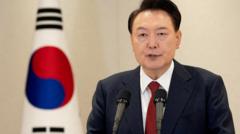Suspended South Korean President Yoon Suk Yeol is embroiled in a significant political crisis following allegations of ordering military intervention to uphold his controversial martial law decree. Prosecutors assert that Yoon directed the military to use firearms, if necessary, to forcibly remove lawmakers from parliament as they moved to reject his declaration.
The incident on December 3 saw Yoon allegedly instructing a general to "break down the doors and drag them out, even if it means firing the guns". This declaration has triggered intense scrutiny, protests, and ongoing political turmoil, culminating in a parliamentary vote to impeach him.
Yoon's martial law decree aimed to confront what he deemed "anti-state forces" among opposition lawmakers, particularly after losing a significant legislative election in April. Protests erupted, with opposition members and supporters converging on the National Assembly, facing military and police barricades.
As MPs eventually gained access to the assembly, prosecutors claim Yoon explicitly directed military leaders to enforce his orders, including potential forceful entry into the voting chamber. The declaration was rapidly rescinded following the parliamentary rejection, prompting Yoon's impeachment process to be instigated with only his cabinet remaining in support.
Yoon's actions have been labeled illegal and unconstitutional by opponents, including figures from his own conservative People's Power Party. Former Defense Minister Kim Yong-hyun, accused of facilitating Yoon’s orders, has been indicted alongside Yoon, raising questions about the leadership's legal responsibility.
The turmoil has greatly affected the political landscape in South Korea, resulting in the resignation of acting president Han Duck-soo. Under immense pressure from parliamentary opposition, Han's departure signals ongoing instability in the South Korean political system.
Public response to the unfolding events has been polarized, as thousands have gathered in rival protests, some calling for Yoon's arrest while others express support for the embattled leader. The political uncertainty has further strained the national economy, with the South Korean currency experiencing significant declines, echoing sentiments reminiscent of the 2007-2008 global financial crisis.
As Yoon awaits the constitutional court’s verdict regarding his impeachment status, South Korea stands at a critical juncture, grappling with the implications of his governance and the overarching quest for political stability.

















